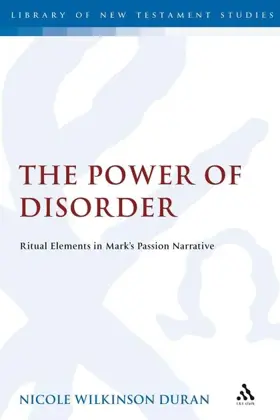

The Power of Disorder: Ritual Elements in Mark's Passion Narrative
in Library of New Testament Studies
Pages
142
Publisher
T&T Clark
Published
2/11/2009
ISBN-13
9780567033062
Mark's Gospel has been seen as history, or as literature. The tensions between these two approaches point to what neither approach can articulate: the rich and ambiguous connections and disjuncture's between human experience itself and human retelling, remembering, and reliving of that experience. This energetic pulling and resistance between our ordered categories and the chaos of existence fuels Mark's gospel and arguably Christianity itself.
With the aid of ritual theory this book seeks to explore that energy in Mark's passion narrative. In particular, Duran uses Catherine Bell's concept of 'ritualization', the process of ordinary actions taking on ritual meaning and form, to examine the ways in which the gospel draws from the chaos of Jesus' death and the wrong, upside-down order it signifies, a frightening kind of meaning and hope. Mark sets out to understand his world through the story he tells, to stake out some area of sense amid what he views as a chaotic universe. His effort to find or produce sense pushes against the very medium of language, going as far as language can into the boundary lands of ritual performance. In his effort to see and to present the apparently senseless movement of this crisis as meaningful, Mark is drawn into ritual, where unexplained and inexplicable actions do have meaning. Defining ritual as an effort to make order of experience without losing the turbulent truth of experience itself, Duran points out ways in which Mark's story engages in such an effort of ritualization.
With the aid of ritual theory this book seeks to explore that energy in Mark's passion narrative. In particular, Duran uses Catherine Bell's concept of 'ritualization', the process of ordinary actions taking on ritual meaning and form, to examine the ways in which the gospel draws from the chaos of Jesus' death and the wrong, upside-down order it signifies, a frightening kind of meaning and hope. Mark sets out to understand his world through the story he tells, to stake out some area of sense amid what he views as a chaotic universe. His effort to find or produce sense pushes against the very medium of language, going as far as language can into the boundary lands of ritual performance. In his effort to see and to present the apparently senseless movement of this crisis as meaningful, Mark is drawn into ritual, where unexplained and inexplicable actions do have meaning. Defining ritual as an effort to make order of experience without losing the turbulent truth of experience itself, Duran points out ways in which Mark's story engages in such an effort of ritualization.
- Table of contents
- Chapter One - Imaging the Passion As Ritual
- Chapter Two - Differentiation: Marking Ritual, Seeking Sacrifice
- Chapter Three - Repetition in Unrepeated Time
- Chapter Four: Substitution In Festival, Sacrifice, And Story
- Chapter Five: "Let The One Who Understands, Understand."
- Bibliography